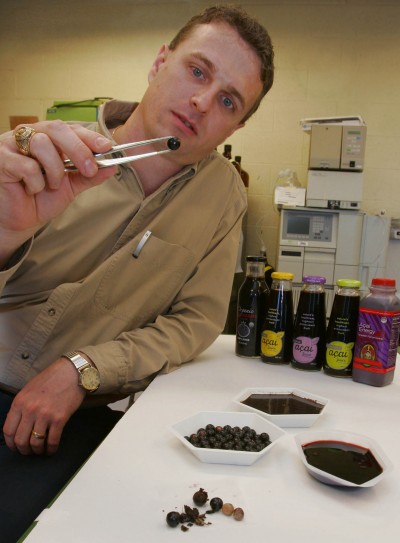Chances are that if you've even stepped near a health foods store in the past few months, you've heard tales of an amazing imported fruit claimed to be one of the greatest super-foods of our time; the Brazilian Acai/Açaí (ah-sigh-ee) berry. Rich in antioxidants and packed full of health benefits, the tiny berry sparked an obsession in the health food world, even without significant laboratory testing.

The Acai is the size of a blueberry but contains twice the antioxidants of its cousin and 10 times more than red grapes - 10 to 30 times the anthocyanins of red wine.
According to Amherst College's Acai Report 2005, Acai berries contain (but are not limited to): Antioxidants, Omega fats 3,6, and 9, Amino Acids, Proteins, Xanthones, Anthocyanins, Dietary fiber, Essential minerals - iron, potassium, phosphorus calcium, and phyonutrients.
The claimed benefits are:
-Increased Energy
-Resistance to colds/flu
-Healthy and more youthful skin
-improved eye sight
-improved circulation
-prevention of degenerate diseases
-slowing of the aging process
-promotion of weight loss
"A lot of claims are being made, but most of them haven’t been tested scientifically," Said Dr. Susanne Talcott, a researcher at Texas A&M University's nutrition and food science department. With husband Stephen Talcott, a University of Florida professor, she has been documenting the health effects of the acai berry. "We are just beginning to understand the complexity of the acai berry and its health-promoting effects."
The team began studying the palm berry in 2001, published a report in 2004, and are still influential in the research of acai berries.
The team evaluated the berry with regard to its antioxidant and nutritional values in both pulp and juice form. They concluded that the berry did indeed contain vast amounts of antioxidants but, as Dr. Susanne Talcott explains, "no one had really tested to see if acai antioxidants are absorbed in humans."
With that, the researchers then decided to find out whether the beneficial elements of the berry were actually being absorbed into the human body or if they were being eliminated from the body as waste.

Susanne Talcott conducted the first test on humans concerning the body's ability to absorb the acai's pulp and juice. The study consisted of 12 volunteers who were asked to consume a single serving of either the acai juice or its pulp. Urine samples of the testers were studied, and showed significant increases in antioxidant activity in the blood.
Voila! Susanne Talcott proved that the super antioxidants from the berry are absorbed and contribute to the health of a human body. Later studies showed another interesting effect of the berries: they show activity against cancer cell development.
Professor Stephen Talcott found that the antioxidant rich acai berry destroyed cultured human cancer cells. His findings, published in the 2006 Journal of Agricultural Food and Chemistry, showed up to 86 percent of leukemia cells tested responded to the berry with self-destruction.
The study extracted six chemicals made from the acai fruit and pulp and made them into concentrations to be tested. When the samples were applied to leukemia cells for 24 hours, between 35 percent and 86 percent of the cells had died.
"This was only a cell-culture model and we don’t want to give anyone false hope," Talcott warns. "We are encouraged by the findings, however. Compounds that show good activity against cancer cells in a model system are most likely to have beneficial effects in our bodies."
Researchers "need to determine potential disease-fighting health benefits, so we can make intelligent recommendations on how much acai should be consumed," says Talcott, and his team hopes to lead with more findings.
"Our concern has been that it is sold as a super food – and it definitely has some good attributes – but it is not a solution to all diseases," she said. "There are a great number of foods on the market, and this could just be part of a well-balanced diet."

So while this exotic little berry might not be the "cure-all" it's hyped up to be, it still holds amazing benefits for the human body and, if consumed, may make you feel better both inside and out.
References:
Research Shows Brazilian Acai Berry Antioxidants Absorbed by Human Body. Science Codex. 07 October 2008.
Brazilian Berry Destroys Cancer Cells in Lab, UF Study Shows. University of Florida News. 12 January, 2006.





Comments